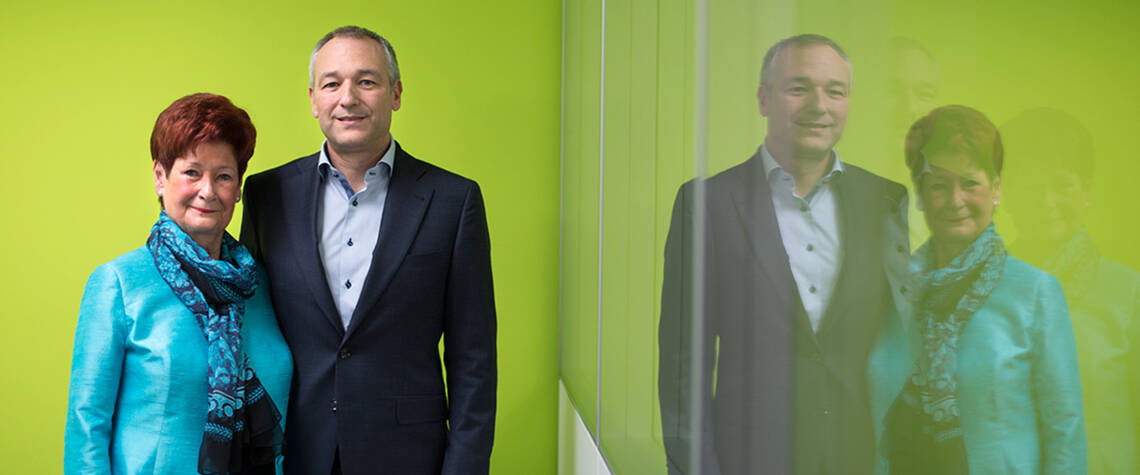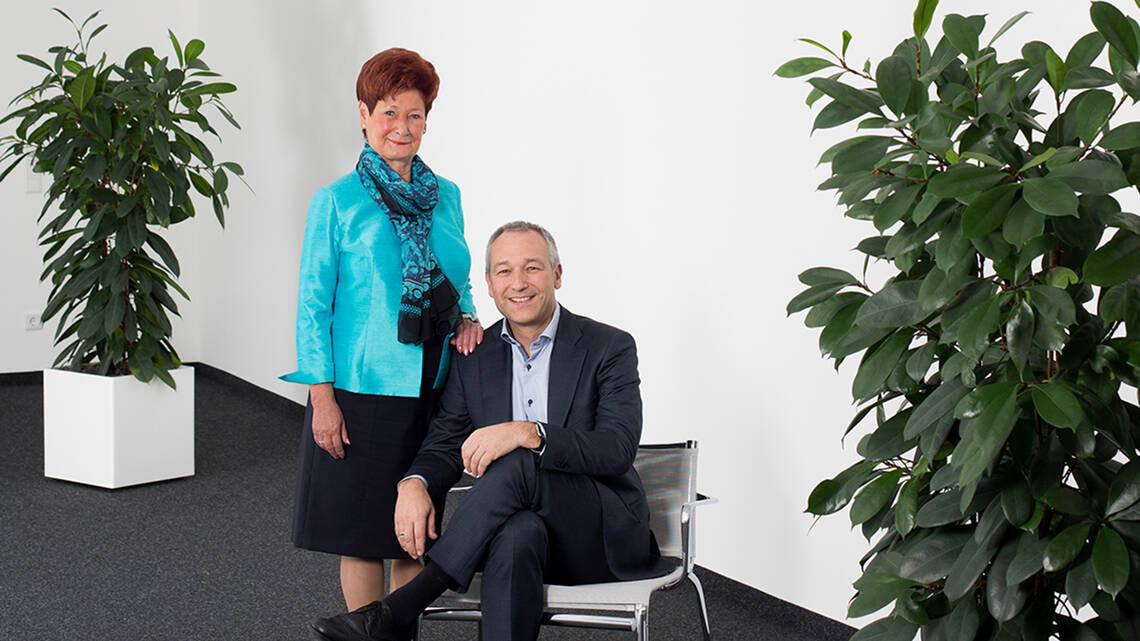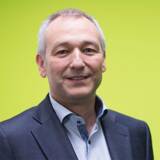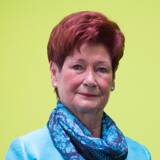
PEOPLE
"We have to exemplify values, not preach."
RATHGEBER CEO Andreas Schrägle and his mother Christa Schrägle on the history and company philosophy of their family business.
Mr Schrägle, you manage RATHGEBER as the third generation. Were you ever given a choice?
Andreas Schrägle: As a company child, you naturally grow into this role. But there are also plenty of examples in which the change of generation fails in a family business.
Ms Schrägle, your father founded RATHGEBER in 1948. In the 1960s, you and your husband took over the company. Would you have been disappointed if the tradition had not continued?
Christa Schrägle: We did not pressure Andreas, parents should avoid that. But fortunately, when parents are excited about what they do it radiates. Of course, the company has always been part of our lives, and of family life.
Andreas Schrägle: I always found our products fascinating. Kids love stickers! And I also thought the other products were great. I am still enthusiastic about them today.
How should we imagine one of your family celebrations - does it automatically become a business meeting?
Christa Schrägle: No, for goodness' sake, you can't do that to children. But of course, my husband and I used to discuss business at home.
Andreas Schrägle: I remember a funny situation: It was Christmas Eve, shortly before the entire production was relocated to Mindelheim. We were trying to celebrate Christmas and not talk about business. After half an hour we had got onto the topic of transport times, logistics, and jobs in the coming weeks. But otherwise, we also of course always make sure to talk about other subjects.
When did you realise that your son would become CEO one day?
Christa Schrägle: Only towards the end of his business studies. We asked him then what he actually wanted to do after his thesis. We were very fortunate that our only child wanted to continue to develop the company.
Andreas Schrägle: Originally, I wanted to do something else first. Going straight from university to company management, that wouldn't have been good. Back then we were already too big.
Christa Schrägle: Luckily, in the early 1990s we were looking for another production site to expand our capacities. We opted for the Czech Republic, which was perfect for us - traditionally the country has a lot of industry, very good technicians and engineers. We took a small screen printer to Bystřice nad Pernštejnem with ten employees and a machine. It was then Andreas' responsibility to develop the site without having to learn directly from his parents.
"We can consciously make decisions that are far into the future. Quarterly thinking is completely alien to us."
Start off by building something elsewhere to prove yourself - did the plan work?
Andreas Schrägle: Yes, it was, in principle, something external, far away from home. In the first two years we did everything ourselves in our small team: from personal interviews to plotter cutting and packaging in the middle of the night. I used to take the packages to the post office, with the installed alarm system and virtually all calculations made. At that time I understood the complexity of the whole. Still today, I am highly familiar with most operations in the company. And now we have about 120 employees in Bystřice.
Christa Schrägle: What we saw then was that you enjoyed doing it. And that is what is needed for doing something well.
Andreas Schrägle: It is an important factor to learn that you gain confidence and are also allowed to make mistakes. At the same time, I always had the opportunity to seek advice from my parents.
Could you say that you learnt by example instead of obligation?
Christa Schrägle: That was certainly so, albeit unconsciously. I think we need to exemplify values, not preach them.
Andreas Schrägle: You achieve a lot when you pass on values like this, unconsciously or consciously. On to the company. How we wish RATHGEBER is strongly driven by personal values. Unconsciously, we look for our employees like this: It's not just about qualifications. We want applicants who fit in with the RATHGEBER philosophy.
The cornerstone of the company was established by Anton Rathgeber. What do you remember about him?
Christa Schrägle: He was happiest in the mountains and had no time to get married. When I was born in the middle of war he was already 41. Before this, he had trained in a wholesale for paper labels. You still had to attach them on the back by wetting them like stamps.
"We can consciously make decisions that are far into the future. Quarterly thinking is completely alien to us."
What happened after the war?
Christa Schrägle: In 1948, he began trade with wooden toys, beer mugs, notepads, and musical instruments. He rented a small truck, procured goods in the Bavarian Forest, and sold them to Munich department stores. Sliding labels were also in the first order book that we still keep with us today. He had the right idea with these labels. Soon he shared a VW Beetle with a representative of the Bavarian region. This was followed by representatives in Würzburg, Hannover, and Cologne.
How was the transition for you?
Christa Schrägle: If my husband and I had not taken over this small company my father would have been hugely disappointed. It wasn't a question, anything else would have been simply unimaginable. My father retired at 65. And I felt that we would get no further as wholesalers. For me it was clear that we needed our own production. My father never wanted this, he wanted to be a trader and nothing else.
Which value is more important for RATHGEBER: Tradition or innovation?
Andreas Schrägle: Both are important, the ratio must be balanced. Too much tradition would slow us down, too much innovation would overextend us. The crucial factor for innovation is our employees. We have wonderful people here that make many autonomous decisions, do a great job, and develop the company every day. Sharing traditions and values help with this. You need a solid foundation to try something new. And we have that. We constantly question ourselves. I think an entrepreneur should be a restless type who does not rest on success.
Christa Schrägle: Always reinventing ourselves used to be an issue. It has only become more urgent because changes happen faster now. For example, 30 years ago we considered taking part of the production to Asia. We went there and decided against doing it.

How was the transition for you?
Christa Schrägle: If my husband and I had not taken over this small company my father would have been hugely disappointed. It wasn't a question, anything else would have been simply unimaginable. My father retired at 65. And I felt that we would get no further as wholesalers. For me it was clear that we needed our own production. My father never wanted this, he wanted to be a trader and nothing else.
Which value is more important for RATHGEBER: Tradition or innovation?
Andreas Schrägle: Both are important, the ratio must be balanced. Too much tradition would slow us down, too much innovation would overextend us. The crucial factor for innovation is our employees. We have wonderful people here that make many autonomous decisions, do a great job, and develop the company every day. Sharing traditions and values help with this. You need a solid foundation to try something new. And we have that. We constantly question ourselves. I think an entrepreneur should be a restless type who does not rest on success.
Christa Schrägle: Always reinventing ourselves used to be an issue. It has only become more urgent because changes happen faster now. For example, 30 years ago we considered taking part of the production to Asia. We went there and decided against doing it.
You operate globally, producing in Germany, the Czech Republic, and Poland. But the RATHGEBER logo shows the Munich skyline and you support the TSV Unterhaching volleyball players. How important is a local presence to you?
Andreas Schrägle: Very important. This is our base, our family's personal environment. It is my absolute ambition that we always get, promote, and expand a German production site. We also have the good fortune that we are not in direct competition with Asian suppliers in our industry. A lot of support and consultation is part of what we do. This requires proximity.
A large corporation would probably still be looking for the cheapest locations. Can you afford proximity as a family business?
Andreas Schrägle: Yes. For us, short-term gains are not decisive. Of course, we have to make money and be profitable. But there are no investors or banks that RATHGEBER would have to justify ourselves to. We can consciously make decisions that are far into the future. Quarterly thinking is completely alien to us. For us, it's not about quick deals, our concern is long-term business models and a stable customer base.
You are the only company in your industry that produces carbon neutrally. Why is sustainability important to you?
Andreas Schrägle: I can't tell you exactly where that comes from. Maybe it is related to our long-term mindset. We do not want to do things that destroy our world to make a profit. We think about the next generations. It is frustrating to see how slowly politics moves when it comes to environmental protection. I think that everyone has to do something to preserve our planet as our heritage.
Is it expensive to deal with resources carefully?
Andreas Schrägle: You have to make an effort. But environmental protection is not an economic killer. If we make our sites energy efficient, reuse our industrial water, and insulate the building perfectly, we save money in the long term. In addition, an effect we had not planned: Younger applicants in particular consider where they want to work very carefully. The argument that we are a carbon neutral company convinced many good professionals who we desperately need.
Competition for the best minds is tough. How do you survive against big business?
Andreas Schrägle: There is a trend towards SMEs. A key factor is that our employees can make a difference here. At our company no one is sitting in a position doing almost the same thing day after day. Our employees can design, get involved, be creative if they want to. Everyone has a responsibility. There is also personal experience and short decision paths. This is more important than a cool company car for many applicants who choose us.
Christa Schrägle: We have a number of employees who have been with the company for decades. For some, family tradition is almost the same as in management: there are young employees whose fathers, uncles or aunts worked here before. This also shapes the atmosphere in the company.
How important is diversity?
Andreas Schrägle: It is absolutely essential to us. We have younger and older employees from different nations, men and women, colleagues with doctorates and those who were trained by us. We benefit from this diversity because our products, the industries in which we operate, our manufacturing processes, and our customers are extremely different. We need a good mix - for example, the experience of older employees and the forward thrust of the younger ones. This makes us strong.
Around half of your employees are women - is equality a value that is important to you as a female boss?
Christa Schrägle: We have only been specifically encouraging women for the last ten years. Before that, a man is automatically who was thought of when it came to leadership positions. Only gradually did we have more and more female employees in management positions. And women are often extremely good in management.
Andreas Schrägle: I am very lucky to also be leading the company as a couple with my wife Andrea. This is something special. A family business does not have to necessarily be a spousal company. We see it as extremely lucky.
How are responsibilities distributed?
Andreas Schrägle: Similarly as with my parents. My wife deals more with human resources development, in-house logistics, and IT processes. I deal more with production and distribution. The advantage is certainly that have a very high level of trust. The disadvantage is that work often comes home with us.
If you and your husband are now increasingly looking at RATHGEBER from the outside: Do you like what you see?
Christa Schrägle: Yes, it's wonderful. We are very happy. Even considering we are very critical and look at everything carefully.
Andreas Schrägle: The wealth of experience and detailed knowledge that my mother and father have is tremendously valuable. We still benefit from it today.
A similar question as at the beginning: Mr Schrägle, do your children have any other choice than to run the company one day as the fourth generation?
Andreas Schrägle: At some point the question will certainly arise of what kind of education is the right one and whether our children want to be involved in the company. We cannot answer that yet. My younger daughter, she is 12, asked me last night how my day was. And so of course I told her about all the exciting things that happened. But the more stressful things are not concealed. My wife and I do it the same as how I experienced it as a child.



